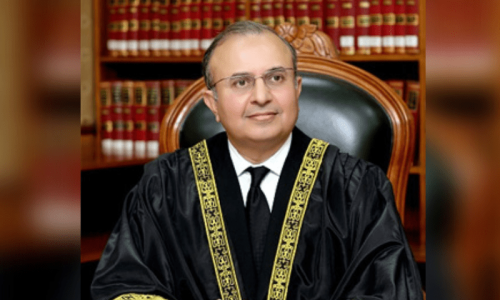WASHINGTON: Turkey’s political crisis has taken a turn for the worse. The chief prosecutor, who has accused the ruling Justice and Development Party (AKP) of anti-secular statements and actions, has presented his argument to the Constitutional Court. The court is expected soon to bar Prime Minister Recep Tayyip Erdogan from politics and disband his party. The only result this struggle can produce is political instability in an important US ally state.
Yet the US government has been curiously quiet about this assault on Turkey’s democracy. While it once actively promoted Turkey as a democratic “model” for the Muslim world, US officials now hesitate to publicly condemn this legal farce. The United States refuses to say aloud what many Turks think: that the chief prosecutor is engineering a military-backed judicial coup. If he succeeds, this will be the fifth time in as many decades that the army has pushed out a democratically elected government.
Closure of the pro-Islamic AKP would be a tremendous setback for Turkish liberals, who have supported the party because of its active commitment to economic reform and European Union accession and its plans to lift repressive laws. It would also undermine US efforts to convince religious Muslims that they can express themselves through the ballot box. The only winners will be Turkey’s military, which is threatened by the AKP’s policies and efforts to liberalise, and former political elites, whose hold on power was weakened because of their own incompetence and corruption.
While the motivations behind the indictment may be transparently political, the barrage of accusations is grave. The AKP’s home-grown critics and Turkey watchers in the United States, seeking to prop up the legal attack, accuse the party of insidiously Islamicising Turkish society. They claim that Erdogan is secretly trying to establish the framework for an Islamic state.
The charges, however, are more fantasy than fact.
Critics cite the AKP’s move in February to lift the ban on female university students wearing headscarves as proof that Turkish secularism is endangered. They also note that the tax on alcohol has increased since the AKP came to power in November 2002 and that last year alcohol consumption fell 2.5 per cent. Additionally, they cite state statistics showing that the percentage of women in the workforce has dropped. Turkish newspapers are rumoured to be lengthening skirt and sleeve lengths before they publish advertisements showing women. More women are said to be covering their hair, in accordance with conservative Islamic principles.
But appearances can be deceptive. If alcohol consumption was a measure of liberty, Russia would be the world’s greatest democracy. And Turkish newspapers are not altering photographs of women.
The decline in women workforce participation is real. It should be welcomed. The reason is not Islamicisation but education: Girls are staying in school longer, thus delaying their entry into the labour force. This process has been underway for at least two decades, meaning it began years before the AKP was voted into office in 2002. In addition, the continued urbanisation of Turkey means that women are less likely to work in the fields unpaid labour that nevertheless counted them as part of the workforce and more likely to be studying. Women literacy in Turkey increased from 76.9 per cent in 1997 to 80.4 per cent in 2006, according to state figures.
As for women covering their hair, the accusation that this is more prevalent is simply wrong. The percentage of women who say they do not cover their hair when going outside rose from 27.3 per cent in 1999 to 36.5 per cent in 2006. What has increased, according to a 2006 national survey by the Turkish social studies research group TESEV, is the perception that more women are wearing the veil. Sixty-four per cent of those polled said that the number of women who cover their hair has grown over the past decade. Moreover, the ban on headscarves is not intrinsic to Turkey’s secular state. It is 10 years old, a product of the last time the Turkish military essentially overthrew an elected government and sought to put its mark on society.
The true test of a party’s democratic credentials is its willingness to submit to free and fair elections. Prime Minister Erdogan did so twice last year, gaining 47 per cent of the vote on a record turnout in the July 2007 parliamentary polls. By contrast, the AKP’s secular opponents, whose dismal record cost them the past two elections, are reduced to cheering the judicial coup on from the sidelines.
The critics are wrong: It is secularism that is failing the test of democracy in Turkey. The AKP’s brand of Islamism plays by democratic rules. If the United States is serious about promoting democracy in Muslim countries, it should stand up for Turkey’s democratically elected government.—Dawn/ The LAT-WP News Service © The Washington Post









































Dear visitor, the comments section is undergoing an overhaul and will return soon.